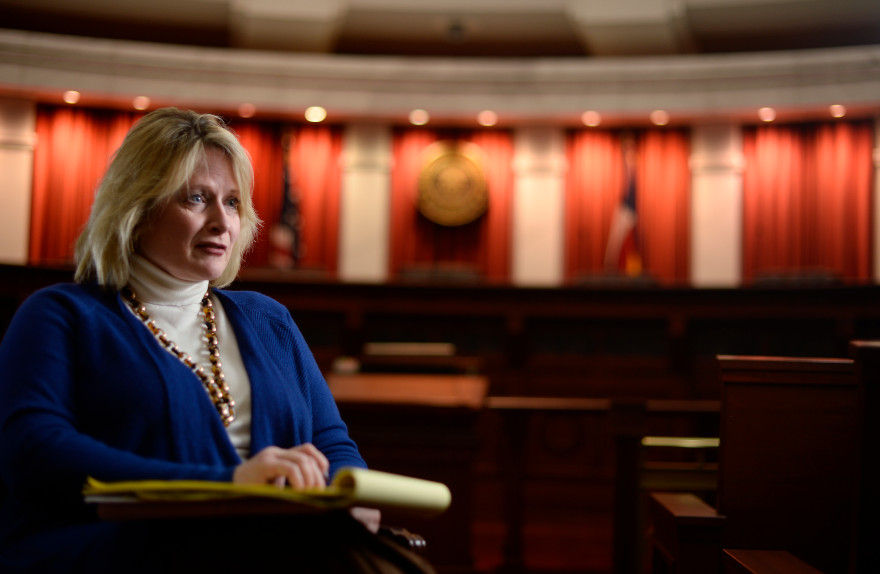
Brave. Principled. Conservative. Those words each came to mind when I heard Colorado Attorney General Cynthia Coffman filed a brief with the United States Supreme Court to protect Colorado’s anti-discrimination law in public accommodations. That law is at the heart of the Masterpiece Cakeshop lawsuit currently pending before our country’s highest court.
In an era where many quasi-conservatives demand Republican politicians pass a litmus test rather than adhere to principled conservative analysis, Coffman stands out among Colorado Republicans. This isn’t a surprise to anyone who has known her long. I first met Coffman fifteen years ago when I worked for then Treasurer Mike Coffman. Brilliant and strong, Cynthia Coffman always had a ready and easy laugh. She also had a fierce adherence to a methodical, conservative review of any legal analysis. She did not deviate just to arrive at a conclusion she personally agreed with. I admired her approach to legal analysis so much that when I graduated law school, I asked her to be one of the three attorneys required to “vouch” for my admission to practice law.
Given that past, it did not shock me when Coffman’s office decided to defend the anti-discrimination law, an outcome many Republicans may dislike. However, defending the law is steeped in multiple classically conservative legal principals.
First, Coffman’s position is a defense of our state’s right to enact its own laws and self-governance. It is a prime tenet of conservative legal thought that states maintain these rights. Based on the Tenth Amendment to the U.S. Constitutions, conservatives vigorously defend these rights as a part of a strong federalist system. In fact, the country’s premier conservative legal organization is named the Federalist Society. Consequently, it is stunning that many so-called conservatives would be willing to undermine Colorado’s sovereign rights in such a fashion. The Colorado legislature duly debated the anti-discrimination law, passed it on a bipartisan basis, and the governor signed it. To eviscerate it now is to eviscerate Colorado’s right to govern its own citizens.
More broadly, Coffman’s brief is in line with nearly 150 years of Republican efforts to enact public accommodation laws. In the decade following the Civil War, Republicans introduced and passed multiple civil rights statutes. Specifically, Sen. Charles Sumner, R-Mass., sponsored the Civil Rights Act of 1875, the very first federal public accommodation law. Struck down in 1883 by the Supreme Court for, ironically, violating the Tenth Amendment, Republicans continued to fight for public accommodation laws in states across the country and on a federal level. After nearly a century of fighting, Sen. Everett Dirksen, R-Ill., helped usher public accommodations back into federal law as a part of the landmark Civil Rights Act of 1964. At the time, Dirksen marked the passage by saying, “The time has come for equality of opportunity” in America.
And that might be where Coffman stands the tallest. Her brief and position underscore the conservative mandate to protect not just liberty, but equality. In fact, just as the country’s founders recognized in the Declaration of Independence, Coffman understands equality is a prerequisite for real liberty. Without equality, the only available “liberty” is a mangled, twisted version.
Coffman’s defense of Colorado law will not be cheered by many of the most vociferous members of her party’s base. However, she is not alone among individuals and institutions traditionally aligned with the Republican Party. To the contrary, business organizations such as the Denver Metro Chamber of Commerce and Marriott hotels have signed amicus briefs in agreement with Coffman. More than 1,300 faith leaders have joined as well. Mayors and municipalities protecting the rights of local governance have come to the defense of anti-discrimination laws.
Sometime next summer, the Supreme Court will finally decide the Masterpiece Cakeshop controversy. In the interim, Cynthia Coffman has put her state and principles above a politically expedient litmus tests. All Colorado should be glad she did.
Mario Nicolais, an attorney and Denver Post columnist, writes on law enforcement, the legal system, and public policy. Follow him on Twitter: @MarioNicolaiEsq


Comments